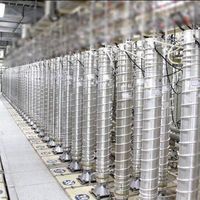Despite US Pessimism, Iran Officials And Media Upbeat On Nuclear Talks
As the United States State Department expressed caution Tuesday over progress in the Vienna nuclear talks Iranian officials and media said a deal could be near.
"At a minimum, any progress…is falling short of Iran’s accelerating nuclear steps and is far too slow,” spokesman Ned Price said at a press briefing Tuesday. “This can’t continue or it will soon be too late to return to mutual compliance with the JCPOA.”
Responding to remarks by Mikhail Ulyanov, Russia’s lead negotiator in the Vienna talks, detecting "indisputable progress," Price told reporters the US has not seen "sufficient urgency" from Iran: "The last couple rounds [of the Vienna talks] also started with new nuclear provocations and then were characterized by, in some cases, vague, unrealistic, unconstructive positions on the part of Iran."
Iran’s Foreign Minister Hossein Amir-Abdollahian, by contrast, said talks were heading “in a good direction” with agreement “conceivable,” given good will and seriousness, on restoring the 2015 nuclear deal, the JCPOA (Joint Comprehensive Plan of Action).
Wang Qun, China’s lead negotiator in Vienna, shared the Iranian and Russian assessment. Wan told Chinese state television (CCTV) Tuesday that continuing talks between Christmas and the New Year reflected a sense of urgency that had been reflected in "positive results."
In an interview with Foreign Policy magazinepublished Wednesday, Ulyanov said China and Russia had (in the magazine’s words) “persuaded Iran to back away from some of its maximalist positions, including its insistence that the talks focus only on sanctions, not the nuclear issue.”
Foreign Policy added that Ulyanov had said Iran had (again, the magazine’s words) “agreed to begin negotiations on the basis of a draft hammered out by the previous Iranian government [of President Hassan Rouhani] this past spring.”Iran’s new negotiation team, appointed by President Ebrahim Raisi after taking office in August, have said the Vienna talks are based around written proposals they submitted at the beginning of December.
Ulyanov downplayed repeated US, European, and Israeli warnings over Iran stockpiling enough enriched uranium for a bomb. “Even if they produce a significant amount of nuclear material, so what?” he asked Foreign Policy. “It cannot be used without a warhead, and the Iranians do not have warheads.”
In the past 3 weeks, hardliner media outlets in Iran, past critics of the Rouhani administration, have put a positive spin on prospects in Vienna, while media that generally backed Rouhani and the JCPOA have been cautious or pessimistic.
Javan newspaper, which is affiliated to the Revolutionary Guards, has argued that the talks have swung in Iran’s favor since the new team went to Vienna. On Wednesday Javan bore the headline "Possibility of a Deal Before February.”
"Vienna is prepared to finalize a joint compromise over a failed agreement [JCPOA]," Javan wrote, adding that at least two of the 4+1 group of negotiators -- France, Britain, Russia, China, and Germany – have expressed optimism about a deal being possible and close. "And Tehran also maintains a similar perspective."








